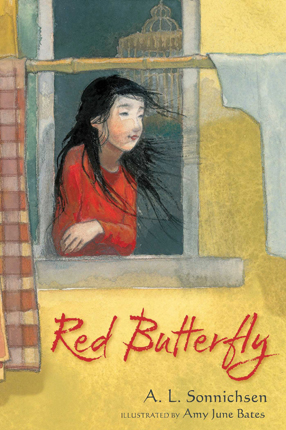Full Text Reviews: School Library Journal - 12/01/2014 Gr 4–7—After being found abandoned as an infant in Tianjin, China, Kara was never formally adopted by her American parents, leaving her with no identity papers. Kara's mother hasn't had a valid visa in years, but she refuses to leave China without Kara. Now 11, the girl is discovered by police who deport her mother and send Kara to an orphanage for disabled children (she has a malformed hand). There she struggles with her feelings of abandonment, and the emotional conflict from the reality that the Chinese government won't let the only mother she's ever known adopt her. But soon a different family wants her. Told in free verse that occasionally plays with form to capture Kara's mood and decorated with small illustrations mixing watercolor and collage, the narrative is broken into three distinct sections: "Crawl," set in Tianjin; "Dissolve," set at the orphanage; and "Fly," set in Florida. Based on the author's own experiences in fostering for years before being allowed to adopt from China, "Dissolve" is particularly heartbreaking and occasionally shocking, despite the underfunded orphanage being (under)staffed by caring adults. Readers everywhere will empathize with and root for Kara as she discovers where she belongs and her true home.—Jennifer Rothschild, Arlington County Public Libraries, VA - Copyright 2014 Publishers Weekly, Library Journal and/or School Library Journal used with permission. Booklist - 02/01/2015 An innocent victim of China’s adoption system, Kara was left in a basket and rescued by an American woman. An unwanted female baby with a deformed hand set Kara apart from birth, but Mama, her savior, was a 60-year-old Montana woman living on an expired visa. That Kara was never officially adopted and her mother was not able to work created for the pair a desperate life of stealth and abject poverty. Kara did not attend school and spoke only English at home, so her native language was stifled, and their world was terribly small, frugal, and fragile. When Jody, Kara’s American sister, comes to visit, their secret is exposed. Kara is sent to an orphanage where she is placed with children with special needs, and she is eventually adopted by an understanding and remarkable Floridian family. Sonnichsen’s sparse narrative in free verse moves Kara’s life along with deliberate sentiment, effort, and loyalty. Sympathetic readers will appreciate that Kara learns to build trust with those who demonstrate their compassion in constructive attempts to right some of the wrongs of her difficult beginnings. - Copyright 2015 Booklist. Bulletin for the Center... - 04/01/2015 “Even though I look Chinese/ I’m American on the inside.” So says eleven-year-old Kara, protagonist of this verse novel, who was abandoned as an infant in Tianjin (not only is she a girl, she has a disfigured hand) and taken in by an American living in China. Life with her American mother has been loving but limited, because her mother has illegally overstayed her visa and Kara was never officially adopted, so there’s little money and Kara hasn’t been able to go to school. When Kara’s visiting adult half-sister ends up in the hospital, the authorities catch up to Kara’s situation; Kara finds herself in a Chinese orphanage, waiting for adoption by a U.S. family but hoping to be reunited with her now-deported foster mother. The story is unusual and compelling, and Kara’s viewpoint is plausibly conveyed-she’s anxious about the scarcity of money, but she never really questions the family situation until she begins to put together bits of information. It’s shocking just how stranded Kara really is, and it’s understandable that she’s resistant at first when she moves to her new adoptive family’s home in Florida. While there’s some appropriate implicit criticism of Kara’s foster mother, the book also respects Kara and Mama’s bond, and Kara’s ability to stay connected with Mama and with her friends in the orphanage is part of the successful synthesis of her experience that gives her a happy ending. Both an individually compelling tale and an acknowledgment of the complexity of adoption, this would draw readers moved by Peacock’s Red Thread Sisters (BCCB 11/12). Small black and white vignettes intriguingly combine digital patterning with sometimes scratchy, sometimes fluid, ink strokes, making vivid use of the generous margins. An author’s note relates her own experience in Hong Kong and China and notes that Kara’s story is based on the true experiences of many unofficial adoptive families there. DS - Copyright 2015 The Board of Trustees of the University of Illinois. Loading...
|



